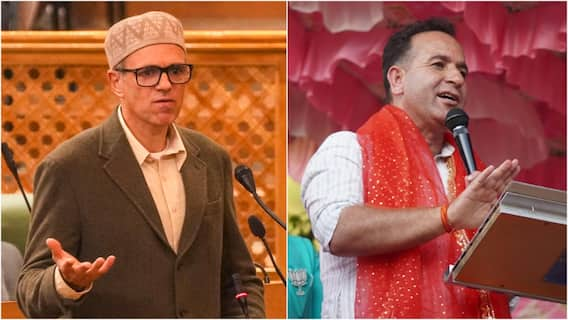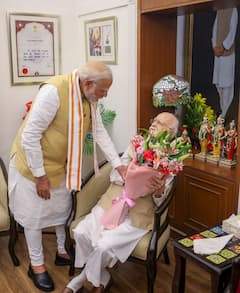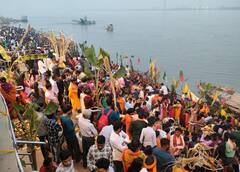India Issues Ultimatum To Pakistan On Indus Water Treaty As Islamabad Seeks Legal Battle Over 2 Hydel Plants
India has said Pakistan violated Indus Water Treaty provisions after World Bank appointed Neutral Expert & Court of Arbitration Chairman in relation to controversial Kishenganga & Ratle hydel plants.

New Delhi: India has issued an ultimatum to Pakistan over amending the Indus Water Treaty (IWT), asking Islamabad to begin intergovernmental consultations over the disputed Kishenganga and Ratle hydroelectric power plants, ABP Live has learnt. The notice was issued to Pakistan on January 25, in which India has said Islamabad has violated the provisions of the IWT over the construction of the two mega hydroelectric power plants, and hence sought an amendment to it, government sources told ABP Live.
“Pakistani intransigence on the Indus Waters Treaty forced India to issue a notice of modification to the Treaty for the first time since the pact came into existence in 1960… Notice was conveyed on January 25 through respective Commissioners for Indus Waters. This is as per Article XII (3) of IWT,” said an official source.
The Pakistan Foreign Ministry on Friday said such reports should not divert attention from proceedings going on at the Court of Arbitration in The Hague.
"A Court of Arbitration is holding its first hearing in The Hague on Pakistan's objections to Kishanganga and Ratle Hydroelectric Projects. The Court of Arbitration has been set up under the relevant provisions of the Indus Waters Treaty," said Mumtaz Zahra Baloch, spokesperson of the Pakistan Ministry of Foreign Affairs.
"Such media reports should not divert attention from the important proceedings of the Court of Arbitration," she further said.
India and Pakistan have been engaged in a bitter battle over the two projects — Kishenganga hydroelectric power plant (330 megawatts) and Ratle hydroelectric power plant (330 megawatts) — as both sides disagree over the technical design and believe it violates the basic tenets of the treaty.
The current imbroglio has erupted following the recent actions taken by the World Bank in this issue. The World Bank, which is also a signatory to the treaty, had been the main facilitator in the negotiations when the pact was signed in 1960.
In October 2022, the World Bank sought to keep the demands made by both sides in appointing a neutral expert as well as a chairman of the Court of Arbitration. While it was New Delhi that wanted a neutral expert to look into the concerns of both sides over the two projects, Islamabad wanted to fight out legally at the Permanent Court of Arbitration at The Hague.
While Michel Lino was appointed as the ‘Neutral Expert’ by the World Bank, as demanded by India, Professor Sean Murphy was appointed as Chairman of the Court of Arbitration, last year, as was asked by Pakistan.
However, India is upset that while an expert has been appointed to look into the matter, Pakistan has made it a legal battle of sorts. According to New Delhi, both demands cannot be accommodated under the provisions of the treaty.
“Such parallel consideration of the same issues is not covered under any provision of IWT … Faced with such violation of IWT provisions, India has been compelled to issue notice of modification,” said a source.
The sources also added that the objective of the notice for modification is to provide Pakistan an opportunity to enter into intergovernmental negotiations within 90 days “to rectify the material breach of IWT".
This process would also update IWT to incorporate the lessons learnt over the last 62 years, they said.
‘India a steadfast supporter of IWT’
India’s contention is that in 2015 it was Pakistan that had first wanted a ‘neutral expert’ to be appointed to examine the technical details of the Kishenganga and Ratle hydel projects. But in 2016, it retracted this request and proposed that a Court of Arbitration adjudicate on its objections.
“India has always been a steadfast supporter and a responsible partner in implementing IWT in letter and spirit. However, Pakistan’s actions have adversely impinged on the provisions of IWT and their implementation, and forced India to issue an appropriate notice for modification of IWT,” said the source quoted above.
This unilateral action taken by Pakistan in 2016 is “in contravention of the graded mechanism of dispute settlement envisaged by Article IX of IWT”.
Accordingly, India made a separate request for the matter to be referred to a neutral expert.
“The initiation of two simultaneous processes on the same questions and the potential of their inconsistent or contradictory outcomes creates an unprecedented and legally untenable situation, which risks endangering IWT itself,” the source told ABP Live.
In 2016, the World Bank also had decided to “pause” the initiation of two parallel processes and request India and Pakistan “to seek an amicable way out”.
Despite repeated efforts by India to find a mutually agreeable way forward, Pakistan refused to discuss the issue during the five meetings of the Permanent Indus Commission from 2017 to 2022, according to the sources.
The IWT allocates the Western Rivers (Indus, Jhelum, Chenab) to Pakistan and the Eastern Rivers (Ravi, Beas, Sutlej) to India. The treaty sets out a mechanism for cooperation and information exchange between the two countries regarding their use of the rivers, known as the Permanent Indus Commission, which has a commissioner from each country.
Top Headlines
Trending News




































